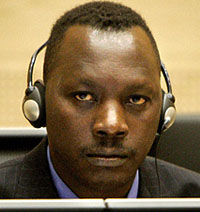THE HAGUE, (Reuters) – The war crimes court at The Hague found Congolese warlord Thomas Lubanga Dyilo guilty yesterday in its first ever ruling after a decade of work limited largely to Africa while major cases elsewhere remain beyond its reach.

The International Criminal Court convicted the little known militia leader of using child soldiers in the Democratic Republic of Congo. But critics noted that deadlock among world powers means the ICC is not even investigating daily tales of atrocity emanating from the Syria of President Bashar al-Assad. Another sitting head of state, Sudan’s Omar al-Bashir, cocks a snook at a three-year-old arrest warrant. And big states including the United States, Russia and China, none of which accepts the jurisdiction of the Court, trade charges of hypocrisy over their own behaviour in places like Iraq, Chechnya or Tibet.
Navi Pillay, a former ICC judge who now heads the U.N. human rights agency, hailed the first verdict in the court’s 10-year existence as a “major milestone in the fight against impunity”.
But her own agency has been forced to lock away evidence it has gathered against Syrian officials of crimes against humanity during the past year’s crackdown on anti-Assad protests, due to the international stalemate in the U.N. Security Council, the only body empowered to order an ICC investigation on Syria.
Many in Congo, and on a continent long ravaged by men like him, welcomed that Lubanga, 51, had been brought to book for snatching boys and girls aged under 15 and forcing them to fight in a five-year jungle war that killed some 60,000 people in the east of the country around the turn of the century.
He will be sentenced only later, and has a month to appeal. But some Africans grumbled the ICC does too little to hold to account others elsewhere, or is succeeding only in hitting the small fry, or losers like former Ivory Coast president Laurent Gbagbo, who now sits in custody on the Dutch coast.
